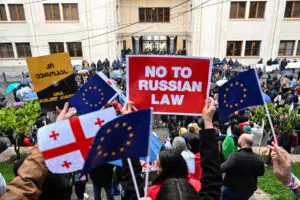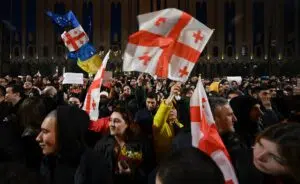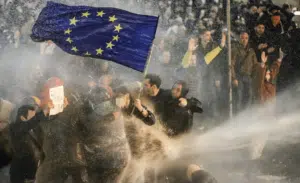Brussels – Georgian citizens are not letting up, and, not even a week after getting back to the streets in the capital, Tbilisi, the protest expanded to more than ten thousand demonstrators opposing the controversial “foreign influence transparency” bill before the return to the polls next October 26. Those staged last night (April 15) bear a strong resemblance to the March 7-8, 2023, demonstrations, albeit on a slightly smaller scale, particularly in terms of the same pro-European spirit and the same claims of opposition to a law disturbingly reminiscent of the one in force in dreaded neighbouring Russia. So much so as to provoke the stern warning of the President of the European Council, Charles Michel, to the government in Tbilisi: “Let me be clear, the draft law on transparency of foreign influence is not consistent with Georgia’s aspiration to the EU and its accession trajectory and will bring Georgia further away from the EU and not closer.”

On the very day when clashes were staged during the parliamentary debate on the issue—with a punch blown by an opposition deputy to the law’s co-author for the ruling Georgian Dream party—thousands of pro-EU demonstrators once again enlivened the protests on Rustaveli Avenue (overlooked by the Parliament building) with Georgia and European Union flags and chanting “No to the Russian law” choruses. With a post on X, the President of the Republic, Salomé Nino Zourabichvili, claimed that “Georgia will not give in to re-Sovietization” and denounced that “the Georgian Dream majority expelled all opposition deputies” when the Parliament’s Legal Affairs Committee adopted the law. From Brussels came hopeful comments toward the new wave of popular demonstrations in Tbilisi, such as that of Italia Viva MEP and Vice-President of the Renew Europe group, Nicola Danti, who on X wanted to remember that “Europe, with all its limitations, is still able to be a beacon of freedom for all.”
Just over a month ago, Georgia’s newly appointed Prime Minister, Irakli Kobakhidze, had guaranteed the EU High Representative for Foreign Affairs and Security Policy, Josep Borrell, that “by 2030 Georgia will be ready more than any other candidate country for membership.” But the very EU candidate country status granted on December 14 last year by the European Council is contingent on progress on EU Commission recommendations on civil society freedom and combating disinformation. Despite this April 3, the Georgian Dream leadership (now led by ex-premier Irakli Garibashvili, who since February 8 has swapped roles with Kobakhidze) re-proposed the contested law again after amending only one passage: all organisations that receive more than 20 per cent of their funding from abroad will have to register as an “organisation pursuing the interests of a foreign power” and not as an “agent of foreign influence”.

For pro-democracy opposition groups in the country, the substance is unchanged from a year ago, and they still fear an alignment with what has been in effect in Russia since December 1, 2022. It is no coincidence that on April 4 from Brussels came the condemnation of EU institutions to the government’s plan and the implicit endorsement of the new street protests, which punctually resumed between April 8 and 9. What we are seeing in Tbilisi is a new contrast between the pro-European population and the government, which, in words, calls itself pro-EU but at the same time pushes for liberticidal legislative projects not aligned with the values of the Union. A repeat of the events from a year ago when, after the first reading of the law was passed by Parliament, tens of thousands of Georgian citizens had taken to the streets with the flags of Georgia and the European Union, shouting slogans such as Fuck Russian law and papering the city with insults to Putin. After two days of uninterrupted protests, the Georgian Dream party had withdrawn the bill without disavowing its initiative, as events in recent days show.
The complex relationship between the EU and Georgia

Despite being granted candidate status for EU membership, the relationship between Brussels and Tbilisi remains particularly complex due to the slippage between an overwhelmingly pro-EU population and a government that is at least controversial about pro-Russian tendencies (although it has since applied to join the Union due to fears raised by Kremlin expansionism). Not only is the difficulty in implementing the reforms required by the path to the Union evident, but over the past two years, there have been incidents that have highlighted the ambiguity of the ruling Georgian Dream party, whose founder is the oligarch Bidzina Ivanishvili, who appears in the non-binding solution of the EU Parliament calling for personal sanctions against him. For example, in May last year, flights between Georgia and Russia resumed after Moscow’s decision to lift the existing ban, and the Caucasian country never aligned with restrictive measures introduced by Brussels against the Kremlin after it invaded Ukraine. Last fall, the government also attempted to put the President of the Republic under impeachment—failed—for a series of trips to the European Union that would have violated the powers of the head of state under the national Constitution.
Straddling Brussels’ June 2022 decision not to grant Georgia candidate status yet, two large pro-EU demonstrations were held in Tbilisi: one “March for Europe” to reiterate the people’s alignment with the values of the Union and a public square call for government resignation. The common features of these demonstrations were the flags—white and red of the five crosses (national) and with the twelve stars on a blue field—signs with pro-European claims and the Georgian anthem interspersed with the Ode to Joy, before the outbreak of harsh widespread protests in March 2023—supported by Brussels—which at least so far have led to the shelving of the controversial bill on “transparency of foreign influence.”
In this scenario, one should not forget Georgia’s particularly sensitive relationship with Russia, a country with which it borders to the north. Its candidacy for EU and NATO membership, enshrined in its national Constitution, has long been a cause of tension with the Kremlin. After conflicts in the 1990s with the two separatist regions of South Ossetia (1991-1992) and Abkhazia (1991-1993) following Georgia’s 1991 independence from the Soviet Union, on the ground, the situation was effectively frozen for 15 years, with troops of the newly formed Russian Federation defending the secessionists within the claimed territory. The attempt to reassert Tbilisi’s control over the two regions in the summer of 2008—wanted by then-President Mikheil Saakashvili—led to a violent Russian reaction on August 7, not only in repelling the Georgian army’s offensive but also leading to the invasion of the rest of the national territory with tanks and air raids for five days. Since then, Vladimir Putin‘s Russia has recognised the independence of Abkhazia and South Ossetia and has deployed thousands of soldiers to the two territories to increase its sphere of influence in the Ciscaucasia region, in violation of the August 12, 2008 agreements.
English version by the Translation Service of Withub






